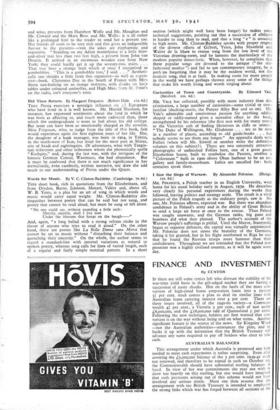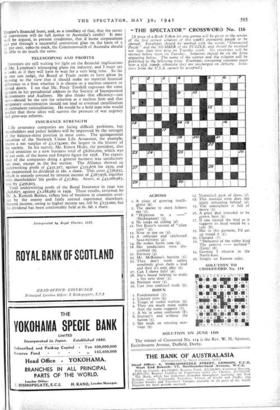FINANCE AND INVESTMENT
By CUSTOS
IF there are still some cynics left who distrust the stability of the war-time yield basis in the gilt-edged market they are having a succession of nasty shocks. Hot on the heels of the mass con- version of high-rated home corporation loans into a 25-year 3+ per cent. stock comes a plan to deal on similar lines with Australian loans carrying interest over 4 per cent There are three issues involved, all of the 1940-60 variety—a Common- wealth 41 per cent., a Victoria 5 per cent., each of just under £6,00o,000, and the £18,000,000 odd of Queensland 5 per cents. Following the new technique, holders are first warned that con- version is on the way without being told on what terms. Another significant feature is the source of the news. Sir Kingsley Wood. —not the Australian authorities—announces the plan; and he backs it up with the intimation that the British Treasury will advance any sums required to pay off holders who elect to take cash.
AUSTRALIA'S BALANCES
This arrangement under which Australia is promised any help needed to meet cash repayments is rather surprising. Even after covering the £5,000,000 balance of the 3 per cent. 1939-41 stock not renewed, and therefore to be repaid in cash on October 1st, the Commonwealth should have substantial sterling balances in hand. In view of her war commitments she may not wish to draw too heavily on this sterling, but one would have imagined that cash payments arising out of this scheme would not have involved any serious strain. Must one then assume that the arrangement with the British Treasury is intended to emphasise the strong links which war has forged between all sections of the Empire's financial front, and, as a corollary of that, that the terms of conversion will do full justice to Australia's credit? It may well be argued, in present conditions, that if home corporations can put through a successful conversion plan on the basis of a
per cent. 196o-70 stock, the Commonwealth of Australia should 'ix able to do much the same.
TELESCOPING AND PROFITS Investors are still waiting for light on the financial implications of Mr. Lyttelton's telescoping plans for industry, and I must say It looks as if they will have to wait for a very long time. So far as one can judge, the Board of Trade seems to have given its blessing to the view that it should make no material financial difference to a firm whether it is chosen as a nucleus concern or closed down. I see that Mr. Percy Toothill expresses the same opinion in his presidential address to the Society of Incorporated Accountants and Auditors. He also thinks that efficiency-not size-should be the test for selection as a nucleus firm and that temporary concentration should not lead to eventual cartellisation or permanent rationalisation. He would be a bold man who would predict that these ideas will survive the pressure of war urgency and post-war reforms.
INSURANCE STRENGTH Life assurance companies are facing difficult problems, but shareholders and policy holders will be impressed by the strength of the balance-sheet position in most cases. The quinquennial valuation of the Norwich Union Life Assurance, for example, shows a net surplus of £5,174,000, the largest in the history of the society. In his survey, Mr. Ernest Hicks, the president, also called attention to a new business total of £6,800,000, which was 6r per cent. of the home and Empire figure for 1938. The experi- ence of the companies doing a general business was satisfactory last year, except in the fire section. The Alliance showed an underwriting profit of £451,317, against £551,676 for 1939, and has maintained its dividend at 18s. a share. This costs £338,632, :which is entirely covered by interest income of £287,958, together with shareholders' life profits of £57,805. Assets, at £43,068,983, :ose by £456,915.
Total underwriting profit of the Royal Insurance in 1940 was :898,627, against £1,188,980 in 1939. These results, reviewed by 11r. A. Kentish Barnes, reflect loss of business in countries over- un by the enemy and fairly normal experience elsewhere. Interest income, owing to higher income tax, fell by £153,000, but
dividend has been comfortably held at 6s. 6d. a share.































 Previous page
Previous page